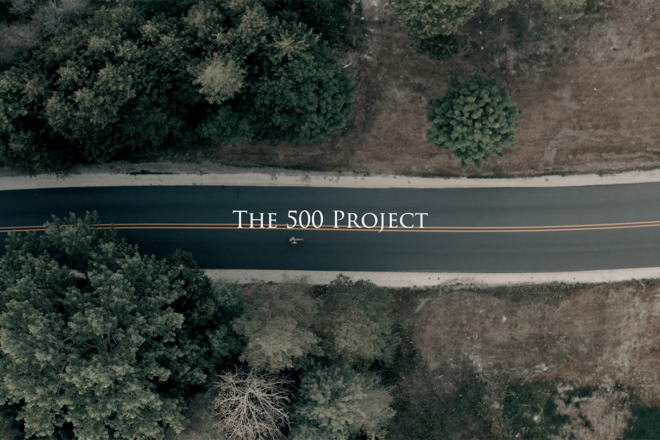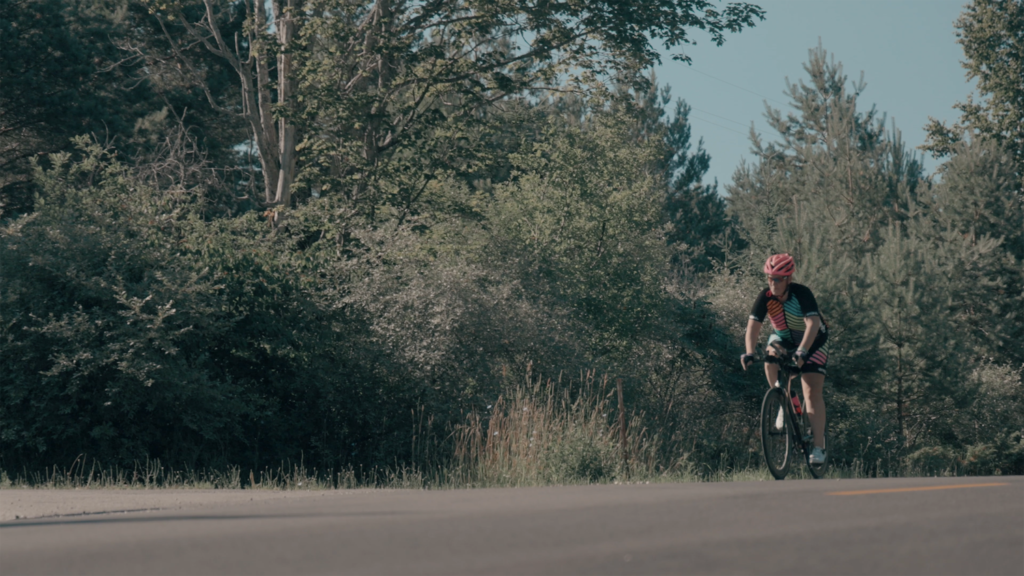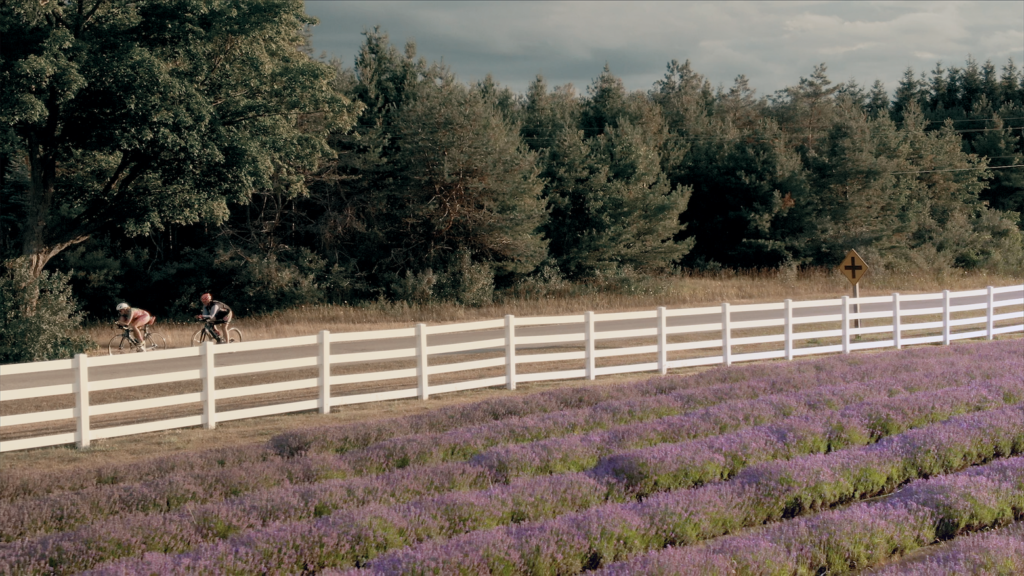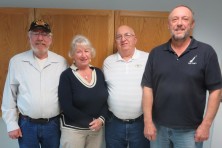The 500 Project
- Share
- Tweet
- Pin
- Share

A one-person camera crew captures a biker’s 44-hour, 500-mile journey
For most participants, the Washington Island Ultra is a grueling test of endurance. But for Arizona-based biker Heidi Videto, who recently lost her best friend and fellow racer in 2021, last year’s ride was a “therapy session.”
“I was feeling all these things on this tiny little island, and it all stayed right there,” Videto said. “It’s like the island was a bubble.”
That bubble never popped. Instead, it was recorded on film by Tennessee-based videographer Ryan Dugger, who edited Videto’s story into a 38-minute documentary that will premiere at this year’s Door County Short Film Festival.
“Sitting down and interviewing her, I knew this was going to be really special,” Dugger said. “I felt so honored to be able to share her story.”
That story began with a tragedy in early 2021, when Videto’s best friend, Mary Knott, was murdered by an abusive ex-boyfriend. Though Videto lived in Arizona and Knott in Texas, the two women had planned to travel up to Washington Island for the Ultra.
It’s an unusual race. Participants can do triathlons, duathlons or single laps (swimming, running or biking only), with a goal to log as many laps as possible during their chosen time limit (12, 24 or 36 hours). Ultra-distance cycling events in particular are rare in America, so bikers often must travel to participate in them. Videto first trekked to the Washington Island Ultra in 2017, and in 2020, Knott accompanied her to cheer her on.
When Knott died, Videto was both devastated and blindsided. She and Knott had planned to tackle the Ultra together in 2021, and Videto didn’t know whether she should do it without her.

She talked it through with her friend Rachel Peterson, a runner, and the two decided to go. But that first Ultra after Knott’s death was a difficult one.
“We were not trained and not ready,” Videto said. “It was a mess.”
That same year, Dugger was working on a video of the race, sending a videographer from his video-production company Creative Revolver to film it. The race was on the company’s radar because of Craig Braun, a close friend of Dugger and the owner of Mammoth Endurance, a Tennessee-based company that organizes the Washington Island Ultra. The race’s unusual location and loyal fan base made it a good candidate for a video, Dugger said.
“This race is so special because it feels like part vacation and part ultramarathon,” he said. And he knew he couldn’t do it justice with just one video. “After we filmed that video [in 2021], we came up with a plan to feature an athlete.”
The videographers wanted to chronicle the experience of an athlete with a powerful story who would be participating in the race again the following year. Braun pointed Dugger toward Videto.
After she agreed to be the subject of the documentary, Videto and Dugger met several times over Zoom, logging in from Arizona and Tennessee, respectively. By the time summer rolled around and the two traveled up to Washington Island – Dugger alone, and Videto with Peterson – they were already comfortable with each other. And importantly, Videto was relaxed enough to unpack some of the darkest moments of her life after she lost her best friend.
At first, Videto was nervous that doing so might affect her performance in the race.
“I was like, ‘I don’t know if I can let all this emotion out and then stay awake for 48 hours,’” she said, but she also noted that Dugger made the filming process an unobtrusive one. “It never felt like a camera in my face.”
Another factor that made Videto more comfortable was her preparation for the race itself. She hadn’t prepared well in 2021, but she wasn’t going to make that mistake again – especially not when she’d be on camera for most of the race.
So for months before the Ultra, Videto woke up at 3 am for long bike rides before work and spent her weekends riding 100 or 200 miles indoors – “basically anything to get used to being in the saddle for that long,” she said. “It gets uncomfortable.”

Preparation was especially important for this year’s race because her goal was to bike 500 miles straight – hence the name of the short film, The 500 Project. Her previous record was 440 miles in one stretch, which she reached during the 2020 Ultra.
Before the race started, Videto asked Braun whether she could bike past the Ultra’s 36-hour cutoff if she didn’t reach her goal in time. Braun agreed. She had friends waiting for her at the finish line, too, and there was an understanding among them that “if it takes you three days, we’re going to stay out here,” Videto said.
Videto started biking at 10 pm on July 30, 2022. She fueled up with a high-calorie electrolyte drink mix as she biked the same 10-mile loop 50 times. Many ultra-distance cycling events are straight shots, so the fact that this one was a loop facilitated more interaction between Videto and Dugger, who stayed at the start/finish line as a one-person camera crew.
“I couldn’t follow her a lot,” he said, “but when she passed the hub, we could do a quick recap of how it was going.”
Dugger rotated among three cameras and piloted a drone to film Videto’s progress. He slept for two hours in nearly two days of the race. She slept zero.
After he returned to Tennessee, Dugger edited footage of the race and the interviews he’d conducted, and he messaged Videto when he’d finished. Unbeknownst to him, the day he finished was Knott’s birthday, and the public premiere of the film at the Door County Short Film Festival falls almost exactly two years after Knott’s death.
“There have been so many little coincidences like that that have been kind of mind blowing,” Dugger said.
Watching the finished film was satisfying for Videto, but not nearly as satisfying as finishing the race itself. At 6:06 pm on July 28, Videto reached her goal. She had biked 500 miles in 44 hours and 6 minutes, exceeding the run time of the 36-hour race by just over eight hours.
“It felt like it needed to be done,” Videto said. “I hate to say, ‘I needed to do it to get closure’ because I’m never getting closure. But it still felt good.”
The 500 Project will be screened at Northern Sky Theater, 9058 Cty A in Fish Creek, around 5 pm on Feb. 18, the second day of the Door County Short Film Festival.


